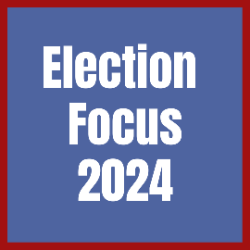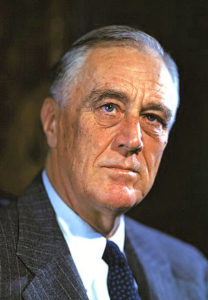 In the aftermath of the Trump victory, the opinion pages of the New York Times and the Wall Street Journal both published post-election eulogies for conventional economics. Remarkably, these columns shared almost the exact same headline.
In the aftermath of the Trump victory, the opinion pages of the New York Times and the Wall Street Journal both published post-election eulogies for conventional economics. Remarkably, these columns shared almost the exact same headline.
Peter Coy’s column in the Times (11/8/24) read “The Election’s Other Biggest Losers? Economists.” In the Journal (11/7/24), Joseph C. Sternberg’s piece was headed “The 2024 Election’s Other Loser: Economists.”
While the headlines were nearly identical, the ideological differences between the Times and the Journal mean that Coy and Sternberg arrived at very different conclusions for the future of the field of study.
Coy’s piece is a lament for mainstream economists, who in his view perfectly analyzed the economic situation of the election, only to have their expertise rejected by the voters. Sternberg strikes a smugger tone, arguing that economists deserve scorn for not understanding what the economy meant to voters, as evidenced by the election results.
Despite their divergent tones, both columns suffered from similar problems, including a fundamental misunderstanding of how voters interface with “the economy” as a political concern.
‘Moment of reckoning’

Peter Coy (New York Times, 11/8/24): “Maybe I’ve spent too much time around economists.”
Peter Coy is the resident economics and business columnist at the New York Times. A longtime writer for BusinessWeek, he is an unabashed apologist for mainstream economics, so when “voters utterly ignored” the wisdom of 23 Nobel Prize–winning economists, Coy seemed to take it personally.
Coy ticked off Trump’s economic sins, including tariffs and immigration restrictions, before conceding that “voters ate it up. Economists were perceived as spokespeople for the power structure—if not outright harmful, then at least ignorable.”
One doesn’t have to be a Trump supporter to recognize that economists (or at least, the ones quoted in corporate media) are generally spokespeople for the power structure. That aside, Coy went on to pose the election loss as a “moment of reckoning” for Democrats:
Should Democrats stick to the economic platform of 2024, which on the whole is based on standard economic principles, with a few concessions to electoral politics, such as promises of mortgage down-payment assistance and fulminations against “nefarious price-gouging”? Or should they go full-on populist to compete with Trump?
Coy was vague on what he meant by “standard economic principles,” elaborating only to say “trade should be free, within reason,” and that “monetary policy should be insulated from politics.” (“Insulated from politics” is what media say when they mean bankers should be allowed to set interest rates without regard for their impact on people.)
In other words, Coy stumped for the status quo, in the most general sense. He believes that Biden bet big and lost on “deliverism,” the idea that voters will reward politicians at the ballot box for material gains delivered. Coy failed to mention the Covid-era relief, like the expanded child tax credit, that was delivered then taken back from US workers. Deliverism is far from full-fledged economic populism, but Coy uses Harris’s election loss to argue that interventions in the economy on behalf of working people are a fool’s errand.
‘Unfortunate’ populism

Franklin Roosevelt
Coy invoked the example of President Franklin Roosevelt, a president who turned to economic populism to “fight off threats” from political populists, as a “reference point” for Democrats.
But instead of investigating why Roosevelt’s populism was successful, both electorally and economically, in an effort to imagine what modern left economic populism could look like, Coy decried a hypothetical progressive populism as “unfortunate”:
Higher tariffs would slow economic growth and raise prices, no matter how many times Trump denies it. As for immigration, effective border controls make sense, but sharp restrictions on new arrivals and expulsion of people who are already in the country would leave millions of jobs unfilled and possibly unfillable.
Most progressives who wish a return to economic populism would agree with this analysis. The problem is that Coy presented tariffs and mass deportations as the only forms Democrats’ economic populism could take. Unmentioned were universal healthcare, a wealth tax and guaranteed basic income, to name just a few examples—odd omissions, given that he acknowledged that FDR called for “higher taxes on the rich, a federal minimum wage and Social Security.”
Advice from the right

A scholar from the highly ideological Hoover Institution advised Democrats to “offer nonideological solutions.” (Creative Commons photo: Jim Naureckas)
Instead, Coy sought advice from Larry Diamond of the right-wing Hoover Institution, and experts from the arms maker–funded Center for a New American Security, on what Democrats can do to “fend off populism.” Their prescriptions include “offer non-ideological solutions…create unifying and aspirational narratives, use blame attributions sparingly,” and other safely capital-friendly methods.
Unsurprisingly, these experts agreed wholeheartedly with Coy’s assertion that left-wing populism in any form is the wrong path for Democrats. The fact that Vice President Kamala Harris lost the election after she renounced the progressive policies she once supported, then offered many “nonideological solutions” of her own, didn’t seem to concern Coy.
Instead, Coy concluded, Democrats would be better served by sticking to their (Hoover Institution–vetted) principles, and waiting for Trump to mess up. “Maybe I’ve spent too much time around economists,” Coy conceded, “but I do think the prescriptions of mainstream economics still make sense.”
It is clear why Coy and his fellow fans of mainstream economics were so disappointed by this election. In his eyes, the Harris campaign did everything right. She ran on an incumbent record that posted strong growth and low unemployment, and lowered inflation rates. She ran on a business-friendly platform (despite Coy’s disapproval of her anti-price-gouging “concession” to voters).
And after all that, Harris lost, decisively. Nonetheless, Coy was optimistic for the future of a Democratic Party committed to centrism: “In the long run, Democrats will be better off sticking to their economic principles while Trump and the party he controls founder.”
‘Those parts that matter most’

Aside from pointing to phony wage growth statistics, the Wall Street Journal‘s Joseph Sternberg (11/7/24) argued that numbers like the “business-investment component of …quarterly GDP releases” mattered most to voters.
Sternberg spent the first half of his Wall Street Journal column (11/7/24) arguing that “prominent economics commentators missed (or chose to overlook) those parts of the economy that matter most to most voters.” As someone who studies Marxian political economy, I am highly sympathetic to the view that the conventional economists have it dead wrong. However, instead of calling for a true reevaluation of the economics field, Sternberg limited his critique to Monday morning–quarterbacking his ideological opponents.
Sternberg claims that real weekly earnings fell 0.5% over Biden’s term in office, as opposed to 7% growth during Trump’s term. Sternberg appears to be looking at Current Population Survey earnings data from the Bureau of Labor Statistics, which show a phantom spike in income just before the end of Trump’s first term. This clearly reflects lower-paid workers disproportionately losing their jobs during the lockdown rather than actual gains for workers’ pocketbooks (FAIR.org, 11/20/24).
More dependable statistics show real incomes increased at all income levels during the Biden administration, and increased the most at lower income levels. Per the Center for American Progress, workers poorer than 90% of all earners saw a 16% increase in real wages (wages adjusted for inflation) between February 2020 and September 2024; workers poorer than 80% of earners saw a 9% increase.
Other analyses similarly found across-the-board income increases from the Biden economic recovery (especially among lower income levels) in terms of both real wages and real weekly earnings. In other words, if you look at data without known aberrations, workers have indeed come out ahead.
Those datasets, however, don’t post-confirm Sternberg’s notion that economists sleepwalked into an election loss. Whether it’s earnings data or anything else, there will always be statistics that can support one’s post-hoc reasoning. Confidently proclaiming which economic indicators decide an election after the election takes place is low-hanging fruit.
Sternberg declared that “only an economist could be surprised by Donald Trump’s presidential victory.” But economists who favorably compared Kamala Harris’ platform to Trump’s weren’t predicting that she would therefore win; they were saying they thought her policies would result in better economic outcomes. That voters most concerned about economic issues picked the candidate most economists thought would hurt the economy is more an indictment of journalism than of economics.
Workers the actual losers

FAIR.org (7/13/23): “Any discussion of Biden’s poor approval ratings on economic policy has to include consideration of the media’s role in manufacturing those ratings.”
The job of communicating economic activity to the masses is not that of economists, after all, but rather journalists and the punditocracy (of which Sternberg is a part). Throughout his column, Sternberg referred to the “economics pundit class,” “economics commentators,” “economists,” “academics,” “punditry” and “economic analysts,” all in more or less the same role. The problem is, these words describe people in a wide variety of jobs, who were by no means united in their electoral prognostication.
FAIR (1/25/23, 7/13/23, 1/5/24) has documented the media obsession with Biden-era inflation, and indeed, continuous news reports that decry the effects inflation will have on people’s quality of life go a long way to shaping perceptions of the economy. When media bleat for years about inflation, and workers recognize that prices have indeed increased, then workers’ justified dissatisfaction with the economy will be identified as “inflation.”
The pundit class has displayed an inability to differentiate between short-run grievances and long-term disaffection. It may be true that inflation is down, thanks to Biden’s remarkable recovery. It may also be true that workers are fed up with the status quo, as represented by Harris’s bid to change “not a thing” about the current administration. Of course, Donald Trump has few real offerings for improvements for the working class, but that is another issue altogether.
To Coy, a dramatic Democratic underperformance, especially among workers, is a sign that economists should stick to the same great policies that have generated historic wealth inequality. To Sternberg, economists are fools because they weren’t looking at the figures that exactly predicted the election, notwithstanding the fact that 1) that’s not the job of economists, 2) he only chose his magic figures after the election took place, and 3) Sternberg’s chief data point, how much voters were paid, is known to misrepresent reality.
As long as writers like Coy and Sternberg fail to understand the motivations of voters, then the losers won’t be the economists, but the workers who are forced to vote for one faction of capital against another.
This post was originally published on FAIR.